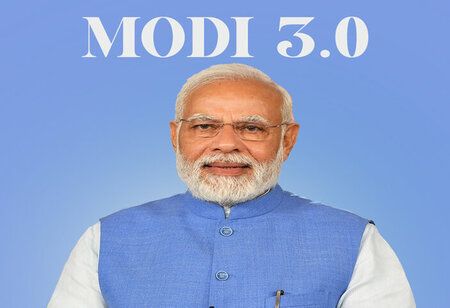If you're an investor in India, you've probably noticed the stock market can get a bit jittery around election time. With this situation at hand in 2024, let's discuss how elections influence the markets and what that means for your investments.
Additionally, If we have to answer the question on why elections move the markets, elections create uncertainty, making the stock market quite a nervous playground to field in. If there is a certain change in power, for instance a coalition government to take for an example it can lead to big policy changes, thereby positively or adversely affecting industries and economic sectors in many ways.
For example, if a pro-business party gets the win, various sectors such as banking, infrastructure and manufacturing are bound to benefit from friendly policies and incentives. While, regulations in sectors like tobacco, alcohol or polluting industries could get more stricter. Furthermore, it's not just policies that can impact the overall economic trajectory. Election outcomes can also adversely affect foreign investor sentiment on top of political stability, and reforms.
Where India Stands Post 2014
It is for certain that the Modi-led government has made India the fastest growing among the major economies. And as per the recent reports, the country is well on its way to become the world's third largest economy. This growth has been achieved due to numerous factors which include lucrative changes in reforms as well as policy dynamism. Atmanirbhar Bharat and Make in India initiatives are some of the most credible operations carried out by the ruling government. Another noteworthy sector to speak of is the manufacturing industry, which has emerged as a big theme for the Indian economy; transforming India as the global manufacturing Hub which has made significant impact on FIIs.
Revisiting the Past
During Modi's rule, India has had high GDP growth, coupled with low inflation which has created a pathway for India to emerge as a global manufacturing power. However, it is for certain that the Lok Sabha elections results have casted a shadow of doubt on the future of the economy for many; creating unbalanced stock market volatility. Furthermore, from the Indian Election standpoint in 2024, the BJP again is regaining its position to run the government for the third time but as per the speculation, with a less powerful stance as it had ruled in the recent past.
Having said that, Fitch Ratings highlighted that the outcome of the results shouldn’t hamper the broad policy continuity as the government is set to continue prioritizing infrastructure capex, and development with respect to business environment, and gradual fiscal consolidation.
If we look at the previous analysis, the BJP-led government had achieved an average of 7.4 percent annual growth in its first term, i.e., from 2014 to 2019. This is the fastest growth India has achieved since 1989. And if we look at the average growth rate for the 10-year period for the BJP-led majority government was 6 percent which included the 5.8 percent contraction which the economy had witnessed in the 2021 financial year due to the disruptions caused by COVID-19 driven pandemic.
Steering Economy while Overcoming Hurdles is the Way Forward
It is quite certain that the absence of a majority of its own for the BJP might weigh them down on the new government's decisions pertaining to politically sensitive reforms. However, less contentious reforms will continue as per a credible source. Here, the new government's priority list may have to be tweaked a little bit, keeping in mind allies' sensitivities. For instance, it is expected that the job creation will grab the center stage while some spending plans could be tinkered with to accommodate greater welfarism.
Reforms in the factors market - land, labor and capital - or free trade agreements with other countries might take longer as per the experts. However, sustained infrastructure push, which includes elevated capital spending, and fiscal consolidation, the recurring features of the government's budgets in the post-pandemic years are unlikely to be reversed.
Sensex Upsurge of 3,000 points in Two Sessions, Giving Investors a Return of Rs 21 lakh Crore
In the recent two days, the benchmark Sensex gained 2,995 points as the stock market rejoiced over the imminent third term for the Narendra Modi-led NDA. Nifty has also increased 937 points since Tuesday. The Sensex finished at 72,079 on 4th of June, while on Thursday, it closed at 75,074. If we look at today’s status, Nifty closed at 22,821, up from Tuesday's finish of 21,884.
Furthermore, the BSE market capitalization increased to Rs 415.95 lakh crore today from Rs 394.83 lakh crore two sessions earlier, giving investors a gain of Rs 21.12 lakh crore. With this growth trajectory at hand, it is quite obvious that the new NDA Government won’t have that much of a problem when it comes to mitigating financial disruptions due to understanding election results.
"It seems that markets have adjusted to the recent election results, and stability on the global front is further boosting positivity. Even if the index may take a break following its recent surge, the overall outlook is probably still good. Since all major industries are involved in the shift, we advise sticking to a "buy on dips" strategy and concentrating on quality stocks when markets are down," highlighted Ajit Mishra, SVP, Research, Religare Broking.
Rupak De, Senior Technical Analyst at LKP Securities stated, “The Nifty will likely trade between 22,600 and 23,000. After yesterday's bullish harami pattern development in the daily period, the Nifty kept rising. But throughout the day, the index stayed in a narrow range, fluctuating between 22,650 and 22,900. In the past two days, the India VIX has dropped significantly below 17, indicating minimal volatility. The index may trade around the 22,600–23,000 range in the immediate future,” highlights Rupak.
A Hope Towards A Positive Market’s Growth
According to Ramesh Punugu, Global Head Buy Side Research at Acuity Knowledge Partners, it is crucial to understand what is next for the fintech sector as the new government prepares to form the cabinet. "As per global fintech adoption index 2023, India's fintech adoption rate stands at 87% compared to the global average of 64%, demonstrating how India has outgrown the global average in terms of digital adoption on the back of ongoing financial inclusion efforts such as Pradhan Mantri Jan Dhan Yojana," he stated.
As per PM Modi's announcement, the NDA will form the government for a third consecutive term to lift market mood. The alliance parties in India said on Wednesday night that they would not seek to form the government and would instead remain in the opposition, which gave the market recovery a further impetus.
“The market will continue to see some volatility as it is now waiting for the government to be reformed. Once it is established that there is business as usual, we can see the continuation of growth in defense, renewable, power, and infrastructure sectors as the government would be expected to invest in them” highlighted Andrew Holland, CEO, Avendus Capital Public Markets Alternate Strategise.


